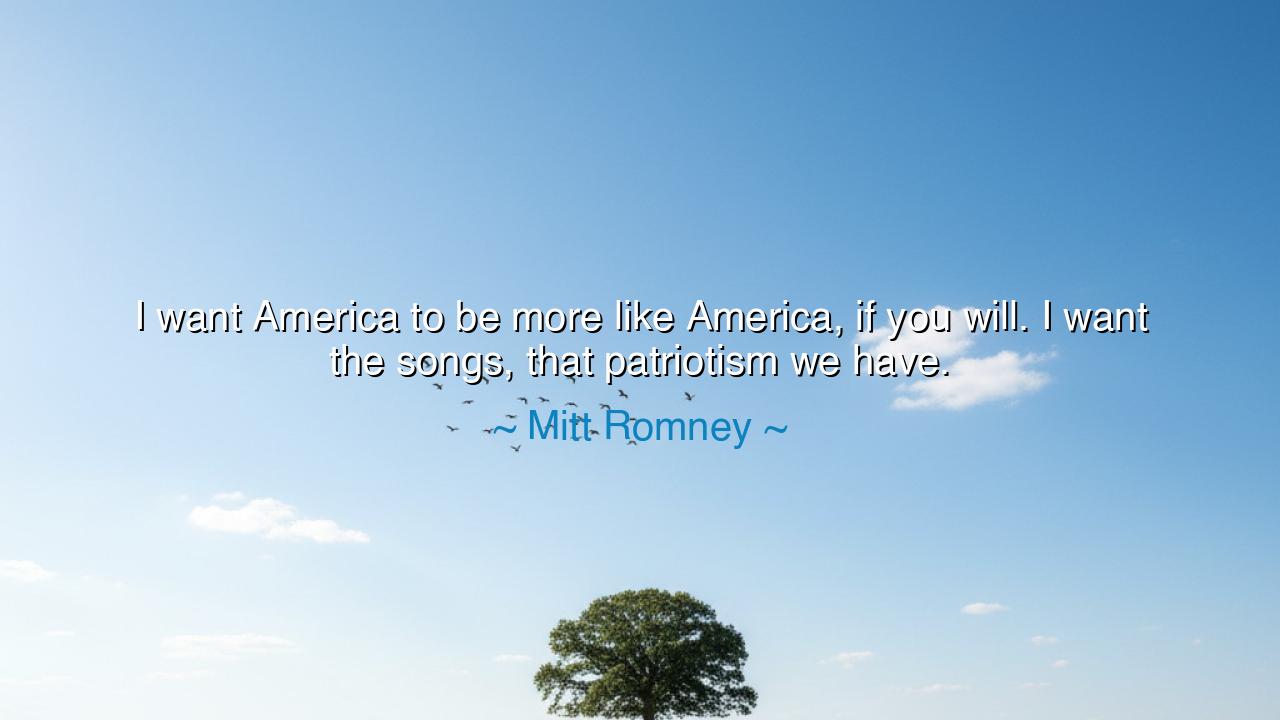
I want America to be more like America, if you will. I want the
I want America to be more like America, if you will. I want the songs, that patriotism we have.






Mitt Romney, a statesman shaped by both politics and principle, once said with yearning: “I want America to be more like America, if you will. I want the songs, that patriotism we have.” These words strike the heart with a paradox both simple and profound. For how can a land be more like itself? Romney’s cry was not for change into something new, but for a return to what is truest in the nation’s soul—the songs, the traditions, and the patriotism that once united hearts across divides. His statement is less about policies and more about spirit: a call to remember who we are at our best.
The origin of these words lies in Romney’s reflections on America’s cultural and civic unity. In times of division, cynicism, and strife, he longed for the simple, unifying expressions of patriotism that once bound the nation together—anthems sung in common voice, rituals that stirred pride, and a shared sense of belonging to something greater than oneself. His invocation of songs points to the deep truth that music and ritual hold nations together in ways politics cannot. Songs are not mere melodies; they are carriers of memory, symbols of unity, echoes of sacrifice, and declarations of hope.
History gives us rich examples of this truth. Consider the War of 1812, when Francis Scott Key looked upon the flag still waving at Fort McHenry and penned the words of what would become The Star-Spangled Banner. That song, born from battle, became more than music—it became the heartbeat of a people. When Romney speaks of wanting “the songs,” he speaks of such moments, when a nation sings not as many voices, but as one.
Or think of Martin Luther King Jr. and the Civil Rights Movement. The marches were filled with songs like We Shall Overcome, hymns that gave strength to the weary and bound communities together. In those songs, patriotism was not blind pride, but a demand that America live up to its promise. Here again, music and shared spirit became instruments of unity and transformation. Romney’s words remind us that these echoes of patriotism are part of America’s deepest inheritance.
The deeper meaning of the quote is that identity must be remembered and renewed. A nation can forget itself, distracted by division, weakened by cynicism. To call America to be “more like America” is to call it back to its noblest virtues: unity, gratitude, sacrifice, and pride in the ideals that define it. The songs are symbols of this collective memory. When sung, they awaken the buried flame of belonging, reminding citizens that they are heirs to a legacy greater than themselves.
The lesson for us is this: cherish and revive the traditions that strengthen unity. Do not let the songs of patriotism fade into silence, nor the rituals of remembrance be forgotten. Teach the young the meaning of the flag, the cost of freedom, and the power of unity. For a people who lose their shared memory lose their shared destiny.
Practically, this means choosing to cultivate gratitude and unity in daily life. Sing the songs not only on holidays, but in moments when unity is needed most. Respect the symbols of your nation, but also embody them through service, sacrifice, and integrity. Create spaces where communities can gather not to argue, but to remember together. Let your patriotism be both a song of the lips and a song of the heart.
So remember, children of tomorrow: when Mitt Romney said he wanted America to be “more like America,” he was calling for a return to the spirit of unity, patriotism, and shared identity that has always been the nation’s strength. Hold fast to the songs, for they carry the soul of a people. And let your life itself become a song—one of service, loyalty, and love for the land you call home.






AAdministratorAdministrator
Welcome, honored guests. Please leave a comment, we will respond soon